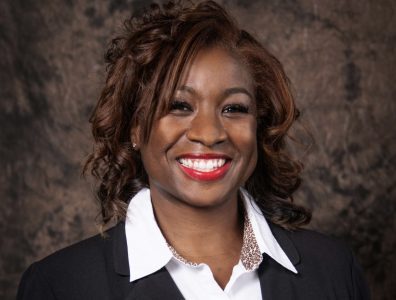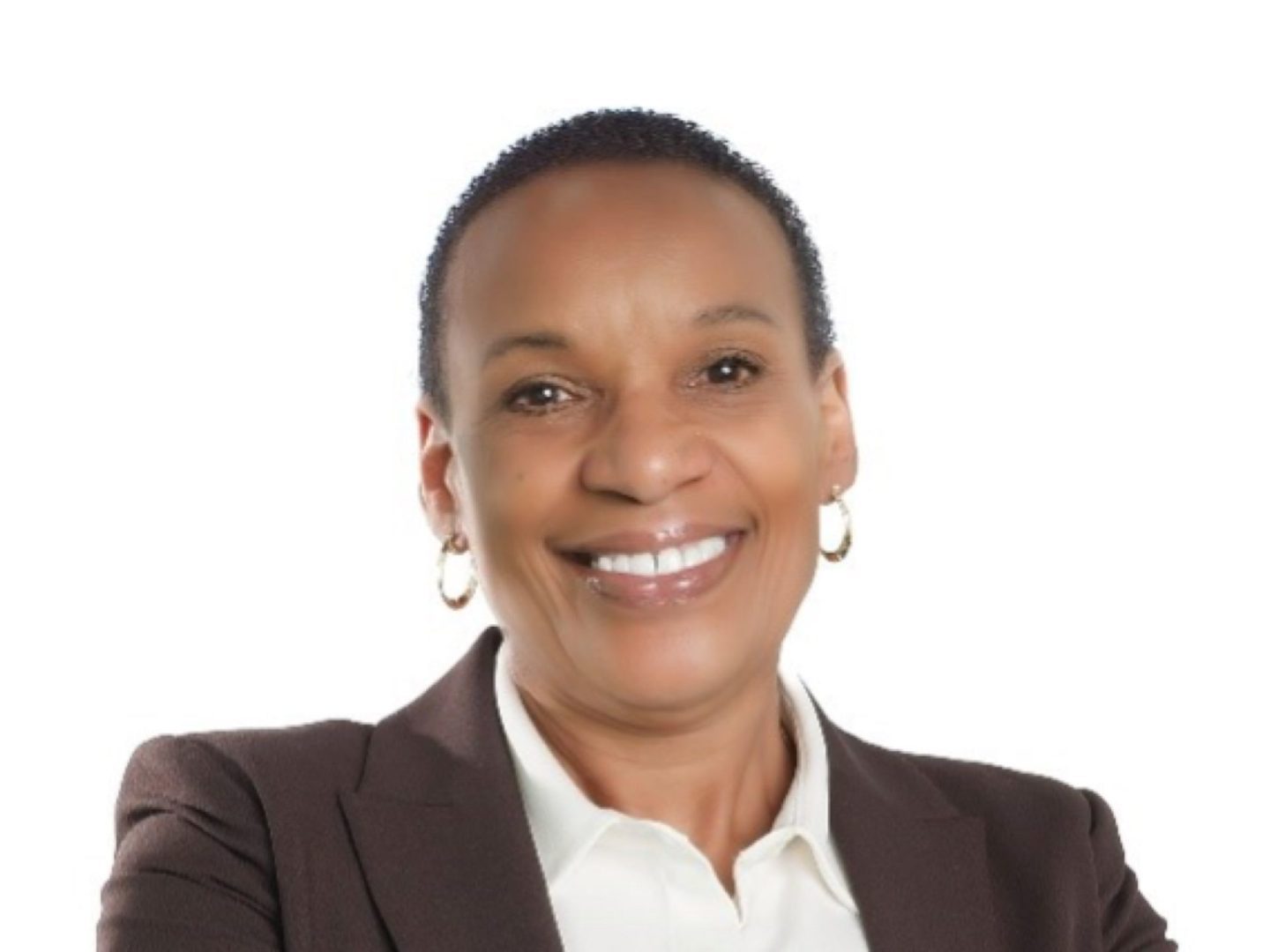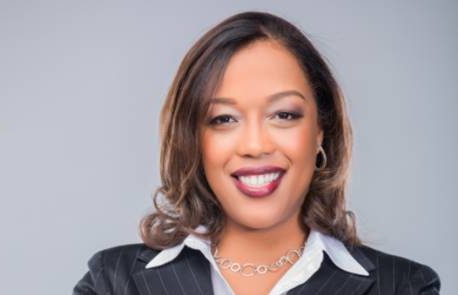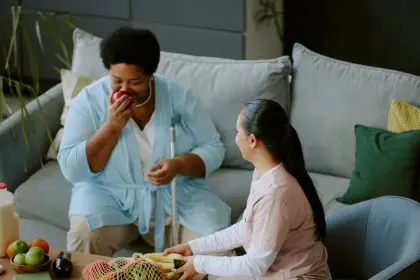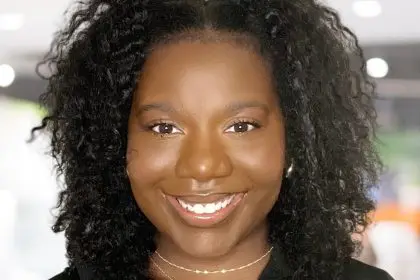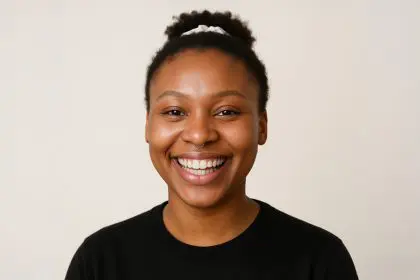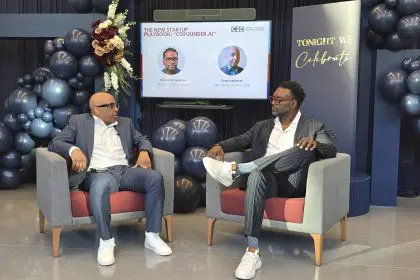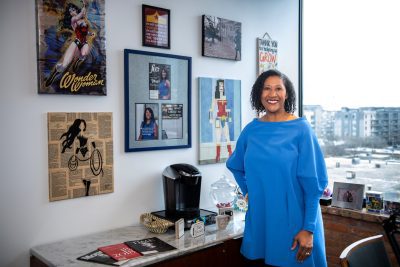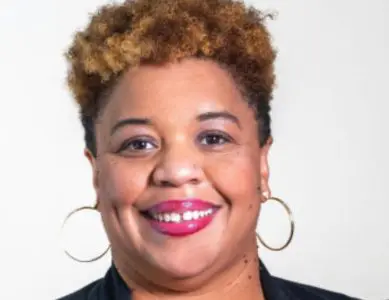Dr. Tamika Sea is a native of Memphis who received a Bachelor of Science in biology with concentrations in comparative women’s studies and visual arts at Spelman College in Atlanta. She has had the privilege of serving the Greater South Atlanta area at Piedmont Henry Hospital, where she has been employed in several administrative roles, including chairman of the Department of Obstetrics and Gynecology.
Her fields of interest include polycystic ovarian syndrome (PCOS) and high-risk obstetrics, as well as utilizing laparoscopy and performing several pelvic floor reconstructive procedures. In her spare time, she enjoys giving back to the community through outreach with Spelman, as well as through with her sisters in the Alpha Kappa Alpha Sorority, Inc. She enjoys painting, interior design projects, and spending time with friends, family and her “fur”-babies.
She talked with rolling out publisher and CEO Munson Steed about her experience at Spelman College and some of the health issues that bedevil sisters of color in particular.
[Editor’s note: This is an extended transcription. Some errors may occur.]
Munson Steed: Ladies, gentlemen, this is Munson Steed and welcome to Sisters with Superpowers. We have, my dear sister, Dr. Tamika Sea. How are you?
Dr. Tamika Sea: I’m doing well, Munson. Thank you so much for having me.
MS: It takes a lot to become a doctor. What and how inspired you and other women? But what inspired you to become a physician, and one that didn’t become a plastic surgeon?
TS: That’s a good question. So, my experience with women’s health started fairly early in my life. My great-grandmother was diagnosed with stage-4 ovarian cancer when I was 13. She was definitely a matriarch of my mother’s side of the family and that diagnosis definitely rocked us to our core. She was diagnosed and then, four months later, she passed from stage-4 ovarian cancer; that propelled me to want to know more about women’s health. I found it interesting that she went to the doctor for all other types of ailments, but there was never a discussion about her women’s health after she went into menopause, which was a very common thing that happened with elder black women in Memphis, Tennessee, where I grew up.
So, it was not only something that wasn’t discussed with her healthcare providers per se, but it was just something that was put on the backburner. Her women’s health after she stopped having children and was in menopause, was forgotten about, and with that a disease process set up that took her life. So for me, it was something that galvanized me to want to learn more about women’s health and actually pursue it as a career.
MS: So you went to college, where?
TS: Went to college at Spelman, Spelman College.
MS: So, for all those women who haven’t had the opportunity to go visit Spelman. Obviously, it’s a phenomenal institution. What was it like to go to Spelman and grow your sisterhood as a sister with superpowers? What is sisterhood really to you?
TS: Oh, my gosh! So, Spelman is magic. That’s the biggest, when people ask me how was your experience at Spelman? My answer is always magic. It was the first time that I was exposed to all types and all shades and all colors of black women that were coming together for a common goal, to educate ourselves in order to promote wellness and well being amongst the world. It literally is magic. Sisterhood is an understatement at Spelman College. Your sisterhood starts so early, as soon as you hit campus.
You are involved in activities with each other that promotes sisterhood, and those are my best friends now to this day, 20 plus years later, after graduation, my sisters, outside of my biological sister, my sisters are my Spelman Sisters, and then you add sorority ties and things like that to the mix. I was a member of Alpha Kappa Alpha Sorority, Inc., on Spelman College’s campus, Mu Pi Chapter. Go, Mu Pi Chapter. And sisterhood was even more elucidated with being a part of that organization, and still being active with all of my sisters. There’s really not a word other than magic that comes to mind when it comes to Spelman College and sisterhood, and what that means.
MS: Thanks for that. Describe what your superpowers are. Just name two.
TS: Let’s see. Of course, being in healthcare, the biggest superpower I say, I have is the power of healing. Being able to be at the bedside of women going through some of the best of times, going through some of the worst of times. Having that capability to be a part of their healing process definitely is a super power for sure. And I think, the other super power, and it’s linked to that. One is the capability to listen. That’s a super power that, as a physician for me, has been so helpful.
I’m able to sit in a room with the patient and just let them talk. And I built my schedule around being able to have meaningful communication with my patients and allowing for them to know that I’m a listener, and I’m here for them. And hear what it is that they’re saying, and actually absorb and comprehend what it is that they need, that they want, that they desire when it comes to their women’s health. So, I think those are my two superpowers that I can think about.
MS: Let’s talk about women’s health and care as a sister with superpowers. If you were going to speak to all women who are going through menopause, what are some of the insights that you would like to share with them, so that they don’t ignore nor feel any emotional shame about the transition that’s happening in their body?
TS: That’s a very good question. Menopause and the perimenopausal process is very daunting for the majority of patients. But when it comes to discussing this condition with women in general, it’s understanding that there’s so many different changes that are happening. And making sure that you ask the questions. And I think the problem is that we wake up. We have a symptom. We don’t know if that symptom is associated with one thing or another. We bypass, we move on our day. We don’t make a mental point to go back and revisit. The thing about menopause, perimenopause, post-menopausal processes is that we need to make sure that we’re making that mental Rolodex about the things that are happening because what we don’t know is that a lot of these symptoms are associated with the mental process.
Not being able to sleep, some people think that’s just, okay, I had insomnia. I’ve had insomnia for the last several months. Okay, that’s a menopausal symptom. Make sure that you’re present, and make sure that you’re putting out on your list of things to discuss with your physician. Of course we’ve read about hot flashes and night sweats, and mood disturbance, and things like that. But decrease energy, weight gain, mental fog, these are all things that are definitely menopausal symptoms, but we don’t put those on our list. because we, A, are not familiar with them, possibly.
We don’t have these conversations at home with our moms and our grandmothers, and our aunts, and our big sisters. So, because of that, we were devoid of knowing this knowledge base. But for us as self-advocates, making notes and putting that in your mental rolodex to discuss that with your physician. There’s no wrong question. There’s no bad question. There’s no silly question. I think, allowing patients to be more open and communicative with their physicians, is what’s gonna help with traversing that difficult process of going into menopause.
MS: You talked about ovarian cancer, and there’s been an uptick. What can women know as a sister with superpowers, that once again they need to take notice? Be aware, and make sure that they’re getting their Pap smears, or whatever else you would recommend.
TS: Sure. So, just discussing ovarian cancer and black women just in general, we’re more inclined to be diagnosed with advanced age disease, more so than any other ethnic population. So with that being said, there are going to be some very insidious symptoms associated with ovarian cancer, as is with a lot of cancers. The biggest thing is making sure that we advocate for examinations. Make sure that you’re coming into the office every year or 2 years for a pelvic examination, including your pap smear, in order to be able to detect and find these symptoms, or these clinical findings along with symptoms.
So, excessive bloating, bleeding that’s out of the norm, pelvic fullness, increased satiety with foods. Maybe if you eat your foods and you’re getting fuller quicker than you normally do, increase an abdominal girth. These are things that you should pay attention to, and these are things that could be worrisome that you should discuss with your Gynecologists. And please, please, please, get your pelvic exams every year to 2 years without fail. This is something that is very, very important in order for the diagnosis and treatment of ovarian cancer because there are no tests.
There is no diagnostic screening. There is no screening tool that we have for ovarian cancer. So, it’s very much a symptom-based and clinical-based diagnosis of cancer. And that’s one of the reasons why we are affected so tremendously because there are no tests that we can perform in order to [diagnose].
MS: Well, I appreciate your honesty, and obviously, that’s your superpower as well. Be honest in good and bad moments but you shared that your grandmother also had that hereditary. What does that say when somebody in your family, particularly a woman, should take note that her grandmother or mother has suffered from this cancer? What should that mean for you in particular?
TS: Absolutely. So, there are genetic screening tools that we have available to determine whether or not you have a genetic risk factor for ovarian cancer. Now, most cancers, all cancers–honestly, a lot of them are just by default. There aren’t any genetic risk factors associated with the majority of cancers, and that includes female cancers. However, if you have a family history of breast cancer, ovarian cancer, uterine cancer and colon cancer, that increased risk factor should definitely have you discuss whether or not there’s a genetic predisposition in your family with your physician.
And, like I said, there are genetic testings that are available. Blood tests. There’s a sputum test that will test whether or not there’s a genetic predisposition in your family, specifically ovarian cancer, and especially if it’s diagnosed at less than the age of 50, that always is an indicator for potential genetic risk for ovarian cancer.
MS: If you were giving a speech on the Spelman College for graduation with you and Kamala Harris on the…
TS: Oh, wow!
MS: She is getting her doctor of letters or law from Spelman. And you were giving a speech to the Spelman graduates. What would the title of your speech be, and what would you challenge them to do?
TS: That’s a hard one, Munson. That one took me off-guard.
MS: You know it’s coming, so …
TS: Gosh! I think the take home message that I would have. I’m not quite sure exactly what the name of my speech would be. But I think the take-home message that I would give to the Spelman graduating class would be to take up space. Take up space, whatever it is that you are uniquely inclined and perfect in doing for you. You take up space in that magnitude, in that career field, in that organization, or what have you. Take up space. Understand that you are exceptionally powerful in what it is that you’re uniquely good at whatever that is, take up space.
MS: Cool. Well, ladies and gentlemen, you heard it first. Be sure that you take her advice. Take up space in this world. She is a Sister with Superpowers. My dear sister, Dr. Tamika Sea. Thank you for being on Sisters with Superpowers.
TS: Thank you, Munson. Appreciate it. Thank you.
MS: Thank you.


